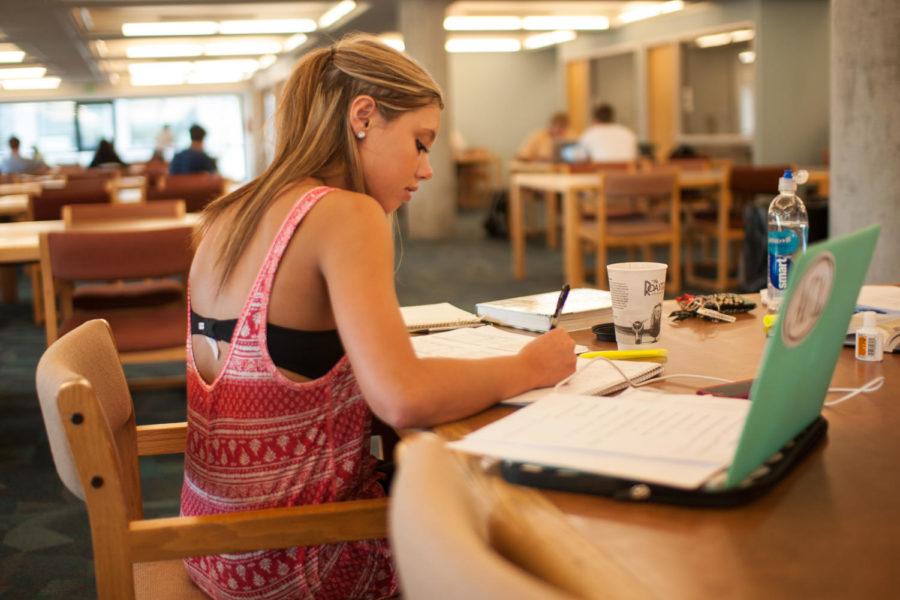Caffeine provides short-term energy boost for students, negative long-term effect when overused
April 30, 2015
The scene is a reoccurring one. A student, bags nestled under both eyes, a drag in the step, stooped over a book or laptop, camped in the library and clutching a caffeine-pulsing beverage.
All to survive Finals Week.
About 90 percent of Americans consume caffeine in one form every single day, with about half of consumers taking in about 300 milligrams, according to a Villanova University caffeine study.
“I think [caffeine] keeps me more awake,” said Lauren Dias, junior in mechanical engineering. “Sometimes it’s to the point where it makes me jittery, but as long as it keeps me awake for finals, then I don’t really care.”
Much like other drugs, caffeine stimulates dopamine, causing it to give therapeutic and addictive qualities.
Dr. Carver Nebbe, a psychiatrist at Thielen Student Health Center, said caffeine has been shown to help with alertness and focus, has curative property for headaches and even has some possible anti-cancer effect. While caffeine increases heart rate and blood pressure, studies have also found caffeine can have protective cardio qualities as well. Caffeine is considered a safe ingredient, according to WebMD.
“There has been a lot of work that has suggested numerous possible beneficial or actual beneficial effects for caffeine,” Nebbe said. “The downside is it’s an addictive substance and can be abused and it has withdrawal associated with it too. So if you are using a lot of it, or using it in a way that might be considered irresponsible, you might have some major impacts from that too.”
According to UpToDate, an online medical source, 400 milligrams of caffeine per day for an adult is safe. Comparing that to energy drinks, an 8.4-ounce Red Bull only contains 80 milligrams. However, if someone has a major Mountain Dew habit, for example, they will exceed that limit.
There are 80 to 150 milligrams in a 6-ounce cup of brewed coffee. The average American who regularly drinks coffee drinks about three cups per day, according to a Harvard study, which could mean up to 450 milligrams of caffeine a day if the coffee is brewed at its strongest.
A 16-ounce coffee from Starbucks contains 330 milligrams of caffeine, one beverage already close to the daily limit.
Over-consumption of caffeine, or four cups of coffee daily, could result in insomnia, nervousness, restlessness, irritability, an upset stomach, muscle tremors and a fast heartbeat, according to the Mayo Clinic.
Caffeine’s effects are usually felt within four to six hours, according to Caffeine Informer.
For those who aren’t partial to the taste of coffee, energy drinks may seem more appealing. But energy drinks’ added sugar add a slew of new health risks. Monster energy drinks contain 54 grams of sugar, about 20 grams more than the daily suggested limit for an adult male and 30 grams more than the daily limit for an adult woman.
Too much consumption of beverages with high sugar levels could eventually wear out the insulin-producing cells of the pancreas, according to Caffeine Informer, which leads to Type 2 diabetes.
The most notable long-term effect of overusing caffeine is disrupting the sleep schedule, according to the Villanova study.
For example, if someone consumes a cup of coffee with 200 milligrams of caffeine at 4 p.m., by 10 p.m., about 100 milligrams of that caffeine is still in their system.
“You may be able to fall asleep but your body probably will miss out on the benefits of deep sleep,” the study says. “That deficit adds up fast. The next day you feel worse, so you need caffeine as soon as you get out of bed. The cycle continues day after day.”
Nebbe recommends using caffeine on a strict schedule and early in the day.
He does not support using caffeine to stay up, instead he encourages using more natural forms of energy.
“Sleep is so vitally important for mental and physical health,” Nebbe said. “[Lack of sleep] can lead to anxiety disorders. You can also end up with paranoia and other psychotic types of reactions in certain cases.”
Nebbe also suggests eating at least three meals a day, performing regular exercise and taking breaks during long stretches of studying.
Students may acknowledge the alternatives, but they aren’t seen as convenient.
“Sometimes we don’t have the time to hit the gym or go grocery shopping for healthy things, so sometimes it’s necessary to rely on coffee but ideally not,” said Jacob Stimes, junior in software engineering.
Nebbe said if students stick to healthy habits and good time management, most shouldn’t need the caffeine to get through the day.
“I definitely don’t think people need caffeine to function,” Nebbe said. “If you pay attention to good, what I call, lifestyle, hygiene, you probably won’t need enhancements.”
Danielle Ferguson contributed to this article.

















